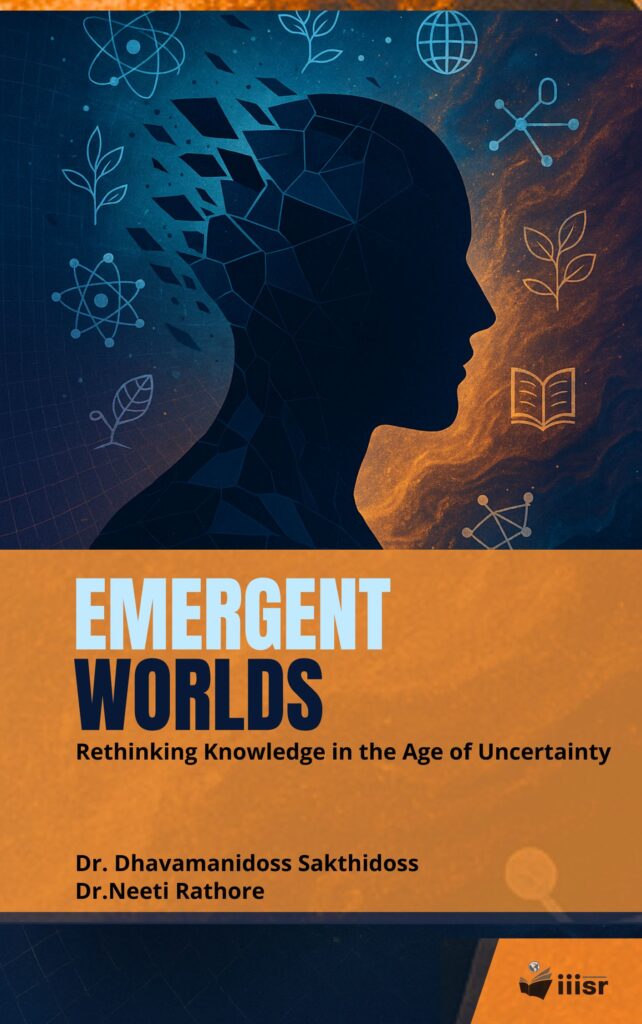Emergent Worlds: Rethinking Knowledge in the Age of Uncertainty

About Dr. S. Dhavamanidoss
- Dr. S. Dhavamanidoss is working as an Associate Professor in the Department of Civil Engineering at Sethu Institute of Technology.
- He has a total of 8 years of experience, including 5.5 years of teaching and 2.5 years of industry experience.
- He received his B.E. degree in Civil and Structural Engineering with distinction, his M.E. degree in Structural Engineering with distinction, and his Ph.D. in Civil and Structural Engineering from Annamalai University, Annamalainagar.
- Dr. Dhavamanidoss has published eight research papers and three book chapters in refereed journals and international conference proceedings. He has also received the Best Presentation Award for his paper presented at an international conference.
- His areas of research include sustainable construction, sustainable materials, geopolymer concrete, geopolymer roads, geopolymer landscape elements, and waste management. He is an active member of IEI and AMIEE.
Dr. Neeti Rathore
- Dr. Neeti Rathore holds a Ph.D. in Chemistry and is NET qualified in Education.
- She is currently working as an Assistant Professor at Zeal College of Engineering and Research, Pune.
- Dr. Rathore has 20 years of experience in teaching, curriculum development, research, and pedagogy.
Chapters List
Part I: Epistemologies in Flux – Unsettling What We Know
Challenges to dominant paradigms and alternative ways of knowing.
- Uncertainty as Epistemic Condition: Rethinking Certainty and Truth
Philosophy, Epistemology - Decolonizing Knowledge: Pluralities of Knowing in a Fractured World
Postcolonial Studies, Indigenous Studies - Situated Knowledges Revisited: Embodiment, Ethics, and Evidence
Feminist Theory, Science and Technology Studies - Unknowing as Method: Embracing Opacity, Silence, and Mystery
Philosophy of Science, Anthropology - The Algorithmic Gaze: Automation, Prediction, and Epistemic Authority
Digital Studies, Critical Data Studies - Cognitive Machines and Emergent Epistemologies in Computer Science
Computer Science, AI Ethics
Part II: Knowledge under Pressure – Crisis, Complexity, and Collapse
How crises and complexity alter knowledge systems.
- The Pandemic Epistemic Shift: What COVID-19 Taught Us About Knowing
Health Humanities, Sociology of Knowledge - Online first: Ecologies of Ignorance: Climate Change and the Politics of Not-Knowing
- Knowledge in Crisis: Truth, Trust, and the Public Sphere
Media Studies, Political Communication - Science on Trial: Expertise and Skepticism in the Age of Conspiracy
Science Communication, Sociology - Broken Futures: The Epistemology of Collapse
Futures Studies, Systems Theory - Strategic Uncertainty: Decision-Making and Knowledge in Commerce and Management
Management Studies, Behavioral Economics
Part III: Reassembling the World – Emergent Knowledges and Practices
Alternative models and collaborative practices in knowledge creation.
- Speculative Thinking as a Tool for Reworlding
Futures Studies, Critical Theory - Commons-Based Knowledge: Open Science, Open Culture, Open Worlds
Knowledge Commons, Digital Ethics - Art as Inquiry: Aesthetics, Imagination, and Epistemic Resistance
Art Theory, Philosophy of Knowledge - Civic Science and Participatory Epistemologies
Citizen Science, Policy Studies - Ritual, Myth, and the Sacred: Beyond Rationalist Models of Meaning
Religious Studies, Anthropology
Part IV: Navigating Uncertain Futures – Toward New Epistemic Horizons
The future of knowledge systems and institutional transformation.
- Postdisciplinarity: Breaking Boundaries in Knowledge Production
Philosophy of Education, Interdisciplinary Studies - Epistemic Justice in a Planetary Frame
Global Studies, Ethics - Online First: Reimagining Industry-Institute Synergy: Challenges And Emerging Pathways
- Learning from the Margins: Subaltern Voices and Epistemic Agency
Decolonial Theory, Social Justice Education - Toward Emergent Epistemologies: Building Knowing Worlds Otherwise
Philosophy, Cultural Theory
